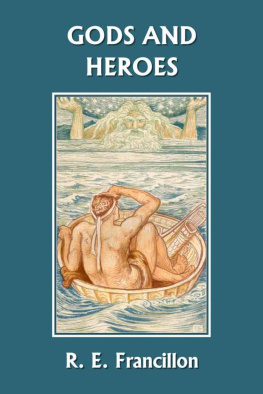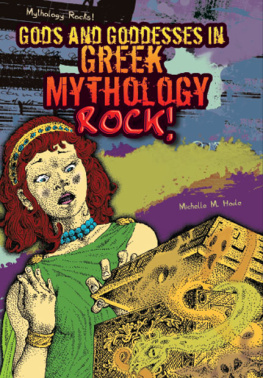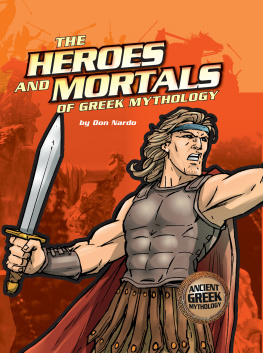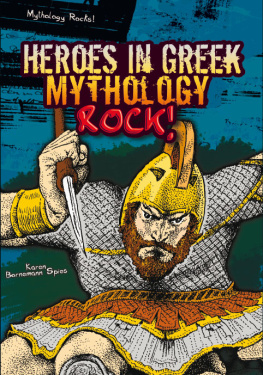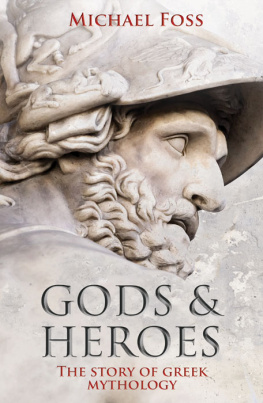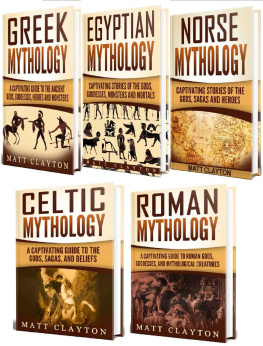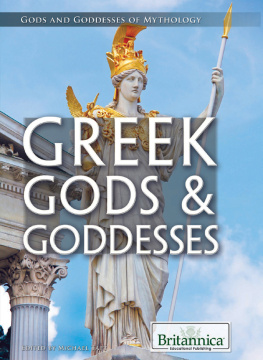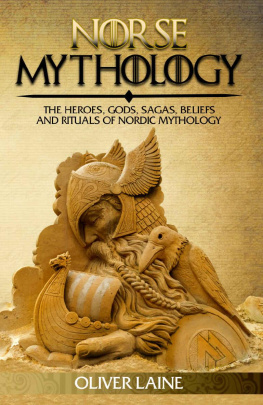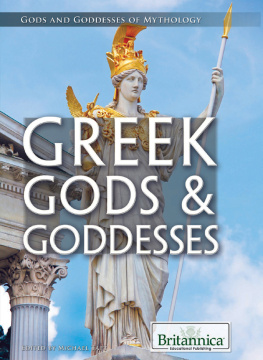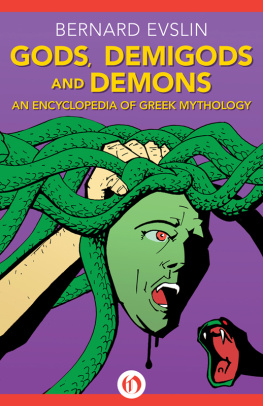R. E. Francillon - Gods and Heroes: An Introduction to Greek Mythology
Here you can read online R. E. Francillon - Gods and Heroes: An Introduction to Greek Mythology full text of the book (entire story) in english for free. Download pdf and epub, get meaning, cover and reviews about this ebook. year: 2007, publisher: Yesterdays Classics, genre: Art. Description of the work, (preface) as well as reviews are available. Best literature library LitArk.com created for fans of good reading and offers a wide selection of genres:
Romance novel
Science fiction
Adventure
Detective
Science
History
Home and family
Prose
Art
Politics
Computer
Non-fiction
Religion
Business
Children
Humor
Choose a favorite category and find really read worthwhile books. Enjoy immersion in the world of imagination, feel the emotions of the characters or learn something new for yourself, make an fascinating discovery.
- Book:Gods and Heroes: An Introduction to Greek Mythology
- Author:
- Publisher:Yesterdays Classics
- Genre:
- Year:2007
- Rating:3 / 5
- Favourites:Add to favourites
- Your mark:
- 60
- 1
- 2
- 3
- 4
- 5
Gods and Heroes: An Introduction to Greek Mythology: summary, description and annotation
We offer to read an annotation, description, summary or preface (depends on what the author of the book "Gods and Heroes: An Introduction to Greek Mythology" wrote himself). If you haven't found the necessary information about the book — write in the comments, we will try to find it.
Gods and Heroes: An Introduction to Greek Mythology — read online for free the complete book (whole text) full work
Below is the text of the book, divided by pages. System saving the place of the last page read, allows you to conveniently read the book "Gods and Heroes: An Introduction to Greek Mythology" online for free, without having to search again every time where you left off. Put a bookmark, and you can go to the page where you finished reading at any time.
Font size:
Interval:
Bookmark:
All rights reserved. No part of this book may be reproduced or retransmitted in any form or by any means without the written permission of the publisher.
This edition, first published in 2010 by Yesterday's Classics, an imprint of Yesterday's Classics, LLC, is an unabridged republication of the work originally published by Ginn and Company in 1910. This title is available in a print edition (ISBN 978-1-59915-085-7).
Yesterday's Classics republishes classic books for children from the golden age of children's literature, the era from 1880 to 1920. Many of our titles are offered in high-quality paperback editions, with text cast in modern easy-to-read type for today's readers. The illustrations from the original volumes are included except in those few cases where the quality of the original images is too low to make their reproduction feasible. Unless specified otherwise, color illustrations in the original volumes are rendered in black and white in our print editions.
O NCE upon a time, the Sky married the Earth. The Sky's name was Clus, and, the Earth's was Terra. They had a great many children: one of these, the eldest, was called Titan, and another was called Saturn.
Terra, their mother Earth, was very good and kind; but their father, Clus, was very unkind and cruel. He hated his own children, and shut them all up under ground, so that he might get rid of themall of them, that is to say, except Saturn, whom he allowed to have his freedom. Saturn grew up; and he thought of nothing but how to set his brothers free. At last one day he went to his mother, and asked her what he could do. Terra had come to hate her husband for his cruelty: so she gave Saturn all the iron she had in her veins(you know that iron comes from what are called the Veins of the Earth)and he made a great scythe with it. With this scythe he wounded and punished his father so terribly that old Clus was never good for anything againin fact, we never hear of him any more, except when we turn his name into Clum, which is the Latin for "the sky," as you know.
Saturn instantly let all his brothers out from their underground prison. They were very grateful to him: and Titan, the eldest, said, "You shall be king of us all, and of all the world, if you will only promise me one thing." Saturn promised. "It is this," said Titan. "You know how our father treated us; and how you treated him. Children are plagues, and I don't want you to have anything to do with them. Therefore promise me to eat up all your children, if you ever have any, as soon as they are born. They'll be too young to mind and you'll be safe from them. I think so much of this, that if you don't eat them up, every one, I'll take the kingdom away from you. For I'm the eldest, and I might keep it if I pleased instead of giving it up to you."
Saturn had no children then, and he gave the promise. But sometime afterwards he married a goddess named Rhea, who was very good and very beautiful. They, too, had a great many children. But, alas! there was that terrible promise that poor Saturn had made to Titan. Saturn could not break his word, so he ate every child as soon as it was born. Of course Rhea was very unhappy and miserable: it was worse, thought she, than if he had only shut them underground. But there was the promiseand she did not know what to do.
But she thought and thought, and at last she hit on a plan. When her next child was born, she hid it away, and when Saturn asked for it to eat it, she gave him a big stone instead of the baby. Saturn must have had good teeth, for he ate it up, and only thought that the new baby's bones were uncommonly hard. The trick answered so well that when the next child was born she did it again,and again she did it a third time. She named the three children that she saved in this way, Jupiter, Neptune, and Pluto.
Jupiter, the eldest, was a very fine, strong child. He made such a noise with his crying that his mother Rhea was afraid Saturn would hear him. So she sent him away to the island of Crete where he was brought up on goat's milk; and she ordered his nurses to make all the noise they could with drums, trumpets, and cymbals all day and all night long, so that nobody could hear him cry and so find out that he was alive.
But unluckily her secret was found out by Titan. Titan thought Saturn had been breaking his word; so he made war on him, and very nearly conquered him and took his kingdom from him.
Jupiter, however, heard the noise of the battle through all the cymbals, trumpets, and drums. He was only a year old, but so big and strong that he rushed out of Crete, and fought a most desperate battle against his uncles, the Titans, to save his father, Saturn. The Titans were wonderful people. All were giants; and one of them had a hundred arms. They threw mountains instead of stones. But Jupiter conquered them at last, and set his father free.
But somehow Saturn was very much afraid of his son. I think I should have been afraid of you if you had been such a wonderful baby. In some way or otherI don't know howhe tried to get rid of Jupiter, and made himself so unpleasant that Jupiter had to take his kingdom away from him, and make himself king. That is how Jupiter became king of all the gods and goddesses.
Saturn, when he lost his kingdom, went to Italy, where a king named Janus received him very kindly. Saturn and Janus became such friends that Janus made him king with him; and Saturn ruled so well that he made his people the happiest in all the world. Everybody was perfectly good and perfectly happy. Saturn's reign on earth is called the Golden Age. His wife, Rhea, was with him, and was as good as he;so he had peace at last after all his troubles, which had no doubt taught him to be wise.
The Greek name for Saturn means "Time"; and Saturn is called the god of Time, who swallows up all things and creatures. All creatures may be called "the Children of Time." And the kingdom of Time, we may say, must always come to an end. The whole story means a great deal more than this; but this is enough to show you that it is not nonsense, and means something. One of the planets is called Saturn.
In pictures Saturn is always made an old man, because Time is old; and he carries his scythe, because Time mows everything away, just as a mower does the grass; or like "The Reaper whose name is Death." Only Death, in the poem, is kinder than Saturn or Time.
W HEN Jupiter became god and king of the whole world, he made his two brothers, Neptune and Pluto, kings under him. He made Neptune god and king of the sea: Pluto he made god and king of Hades. Hades was a world underground, in the middle of the earth, where men and women go and live when they die.
The next thing that Jupiter did was to marry Juno. Their wedding was the grandest and most wonderful that ever was seen. Invitations were sent out to all the gods and nymphs. The nymphs were a sort of fairiessome of them waited upon the goddesses; some of them lived in rivers, brooks, and trees. All of them came to the wedding, except one nymph named Chelone.
She refused to come: and, besides that, she laughed at the whole thing. When they told her that Jupiter was going to marry Juno, she laughed so loud that Jupiter himself could hear her. I don't know why she thought it so ridiculous, but I can guess pretty well. I expect she knew Juno's bad temper better than Jupiter did, and how Jupiter was just the sort of husband to spoil any wife's temper. But Jupiter was very fond of Juno just then, and he did not like to be laughed at on his wedding-day. So he had Chelone turned into a tortoise, so that she might never be able to laugh again. Nobody ever heard a tortoise laugh, nor ever will.
Font size:
Interval:
Bookmark:
Similar books «Gods and Heroes: An Introduction to Greek Mythology»
Look at similar books to Gods and Heroes: An Introduction to Greek Mythology. We have selected literature similar in name and meaning in the hope of providing readers with more options to find new, interesting, not yet read works.
Discussion, reviews of the book Gods and Heroes: An Introduction to Greek Mythology and just readers' own opinions. Leave your comments, write what you think about the work, its meaning or the main characters. Specify what exactly you liked and what you didn't like, and why you think so.

